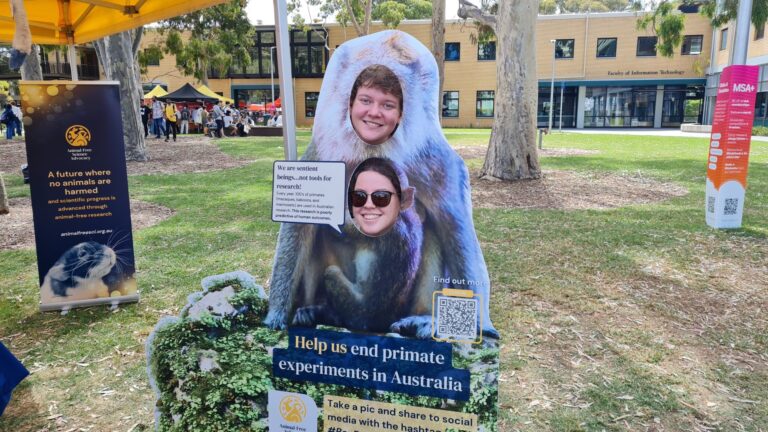
About Animal-Free Science Advocacy
Advocating for scientifically valid animal-free science
Our Vision
“A future where no animals are harmed in the name of science, and scientific progress is advanced through animal-free research methods”

Many people care about all living beings and scientific progress. Kindness to animals and scientific innovation already exists – in the form of animal-free science.
At Animal-Free Science Advocacy, we envision a future where scientific research is not at the expense of animal lives. Compassionate science can lead the way to innovative solutions.
Join us in championing animal-free research methods. Together we can create a path towards medical progress that aligns with shared universal values of empathy and progress.
Our Values
- Compassion — for animals used in science and for all beings reliant on safe and effective medical and scientific progress
- Respect — for the scientific process and towards all who may hold opposing viewpoints, or work in the animal-based research industry, whom we will treat with courtesy and civility
- Integrity — in providing factual information about animal-based research
- Courage — to speak out in the face of opposition and on behalf of animals who cannot speak out
- Commitment — to continuously challenge the status quo by advocating for scientifically valid animal-free methods of research
- Transparency — in all of our undertakings to promote positive solutions that advance animal-free science
Mission Statement and Principles
Animal-Free Science Advocacy work professionally, ethically, and with compassion for all beings as our driving motivation. We build public awareness of animal experimentation; to pursue all reasonable channels to eliminate animal experimentation in any form or industry, and to champion the beneficial adoption of animal-free alternatives to all forms of animal usage throughout scientific and medical research and teaching.
We hold and maintain the following as core principles:
- Research data obtained from animal experimentation and extrapolated to human conditions is unreliable and ineffective, and delays progress for human health.
- Animal-based research and teaching represents unnecessarily cruel, empirically compromised and unethical treatment of non-consenting sentient beings.
- The replacement of animals with validated non-animal methods will facilitate scientifically reliable, effective, empirically valid research outcomes.
What kinds of research are we opposing?
Science and research are very broad areas. AFSA recognises that some research, such as observation of wild animals for conservation purposes, is non-invasive, and that is some circumstances, veterinary research or training can be conducted without harm to animals. Whilst we advocate for animal-free research, we accept that under very limited conditions, animal use may be permissible, when in the interests of the individual animal/s used in such research. It is impossible to foretell all such cases and AFSA reserves the right to assess each research protocol on its individual merits.
Put simply, we oppose any harmful use of animals in science
By science we are referring to biomedical science (both fundamental and applied research), regulatory science, chemical testing, agricultural research, veterinary research, science teaching, and any other scientific discipline that may entail animal experimentation.
What do we mean by ‘harmful use’?
We adhere to this definition:
Any use of animals that cause pain, suffering, distress, or lasting negative impact, including death—without any clear benefit to the animals themselves[1].
It is important to note that even if the research conducted is not considered harmful, the laboratory environment itself can cause suffering and the prevention of natural behaviours and thus be detrimental [2].
[1] Zemanova, M.A.; Knight, A.; Lybæk, S. Educational use of animals in Europe indicates reluctance to implement alternatives. ALTEX 2021, 38, 490–506
[2] Balcombe J. Laboratory rodent welfare: thinking outside the cage. J Appl Anim Welf Sci. 2010;13(1):77-88. doi: 10.1080/10888700903372168. PMID: 20017048.
- Humane: showing kindness, care, and sympathy towards others, especially those who are suffering (Cambridge Dictionary)
- Inhumane: without compassion for misery or suffering; cruel (Oxford Languages)
- Cruel: extremely unkind, or causing people or animals to suffer (Cambridge Dictionary)
- Suffering: the experience of unpleasant emotions such as fear, pain and frustration and absence of positive experiences (Animal-Free Science Advocacy)
Collaboration
Animal-Free Science Advocacy recognises that there are logistical, institutional, economic, and regulatory barriers to transitioning to human-relevant research, all of which are frequently raised at Congresses such as the World Congress for Alternatives and Animals in the Life Sciences. Animal-Free Science Advocacy is open to collaboration with individuals and organisations to overcome these barriers and to work together to incentivise a phase-out of animal experimentation. With no phase-out plan in Australia, AFSA supports the principles of the RSPCA UK 2030 Phase-out Plan, the Cruelty-Free International Target Xero report, the Eurogroup for Animals Strategy, and the PETA Research Modernization Deal. AFSA supports the recommendations of the 2023 CSIRO report Non-animal models: A strategy maturing Australia’s medical product development capabilities.
Reporting
Animal-Free Science Advocacy’s annual activity statements are available on the ACNC website.
Stay informed
Sign up to our newsletter for all the latest news and SMS campaign alerts.
"*" indicates required fields
© 2024 Animal-Free Science Advocacy | ABN 17 208 630 818 | Privacy Statement | Terms & Conditions